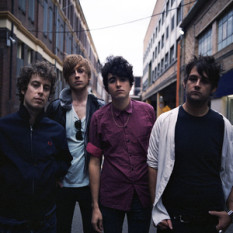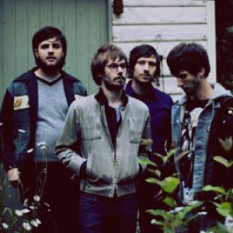Somewhere in the Blue Mountains, just outside of Sydney, Australia, lives Aidan Roberts. He is the primary songwriter, singer and instrumentalist for his pet folk-rock project, The Maple Trail.
Sporting a dark beard and curly hair, Aidan spends his time writing and recording music from his home, forging an existence somewhere between serenity and mayhem. The Maple Trail is somewhat of a personal odyssey; a constant musical journey that has traversed the ravines of Sydney’s metropolitan limits, and rearticulated itself across hundreds of hours of tape and performances, leaving behind no less than 5 unreleased EP's, but now culminating a full-length release, Dirty Echo Spark. Out this winter on Sydney's Broken Stone Records (www.brokenstonerecords.com)
Born in the winter of 1979, Aidan seems most at home, creatively, during the colder months. For years he has made something of a pattern of writing and recording songs through the Autumn and Winter months.
“I like the dark time, the cold climates,” Aidan says. “I think the cold weather wakes my brain up, and that's when your thoughts run wild, when your brain is really active and there's a lot of lone time, you know, down-time. That's when the ideas come, and it feels more natural to work away in your books and with your instruments. It's also the time when you take in a lot more stuff – reading, writing, research, listening to records.
The Blue Mountains is home to a vivid, if quietly slow-burning, music scene. A small network of bands and songwriters, largely friends amongst themselves, have given rise to records of high acclaim recently from bands like Cloud Control, The Holy Soul, and the psychedelic folk-rock quartet Belles Will Ring, for whom Aidan is also a contributing songwriter and lead guitarist.
Recorded at Aidan's home throughout the winter and spring of 2007, Dirty Echo Spark began as a semi-improvised multi-track jam. Having recently returned from a short stay in New York City, Aidan set about creating songs in a new way – taking one simple idea for each song and simply playing for several minutes with the tape rolling. As thematic ideas emerged while playing the guitar, Aidan began to lay down more instruments, weaving between the tape machine and lyric book, soon assembling a core collection of 5 or 6 songs from which he planned to build an album, attempting to distill the emotional and musical climate of this particular time.
“When I got back from New York I bought this great old 1950’s no-name acoustic guitar from a crazy shop in Katoomba for 250 dollars,” he says, “which I fixed up a bit and got it going; it was kind of hard to play but I liked that – you had to work with it. It had the most beautiful boxy old-fashioned sound, I would play it all the time simply because I loved hearing it. All of these songs were born out of me just playing patterns on this guitar, rolling tape. I then started to marry the musical ideas with lyrics I'd written on the New York trip, and it started building from there – it felt like an album.
The songs that eventually grew into the material of Dirty Echo Spark could be described as electric-folk epics; ragged and joyous, at times elegiac. The eclectic sounds that populate the songs are as much a part of the instruments used (Aidan having experimented with various forms of piano, mandolin, electric instruments, weird percussion and random household objects such as the barrel of a washing machine – recognizably thumping away in 'New York') as they are a result of experimental recording techniques.
A majority of the instrumentation on Dirty Echo Spark was recorded in odd and varied locations; both in and outside. In doing so, Aidan welcomed uninvited sounds into the songwriting; much of which became integrated into the final mix of the record. Aeroplanes, traffic, wildlife, rain, wind, fire, footsteps and television sets weave their own music in and out of the songs; drawing lines between the landscape of Aidan’s existence, and his restless internal musical monologue. To fully bring these strains and experimentations to life, Aidan drew on his musical peers, friends and loved ones to help fill out the album instrumentally. Songwriters, friends and associates including Liam Judson (also of Belles Will Ring), Daniel Holdsworth, Des Miller, Sam Worrad, Mike Lloyd and Pip Smith came to the tape machine nestled in Aidans lounge room amongst records, instruments and carpet, to contribute to the record's vocal and instrumental soundscapes, further augmenting Aidan's initial recordings and transforming the group of songs into a dynamic unit with its own life and direction.
When asked about his influences Aidan points out that his varied musical diet has led his brain down many paths from alternative-country to avant-garde film scores. He grew up listening to Simon & Garfunkel, Bread, and “all that folky singer-songwriter stuff that mum & dad used to play led me to explore that side of music, which is where I get the melody and storytelling air from. I mean, you'll likely hear remnants of On The Beach, Nashville Skyline, Tapestry etc in there; but also Tubular Bells, War of the Worlds and all that shameless 70's mucking around stuff. I love that free-spirited approach to rock music. It has its boundaries I suppose; but early on that's what inspired me.”
Aidan has worked for the theatre composing incidental scores and soundscapes for many plays including King Lear, Some Voices, Traitors, and Hotel Sorrento, and he is a self-professed film music nut. Does some of this music inform his more traditional songwriting?
“Of course, I've learned a lot from playing with instruments that are unfamiliar to me, and blending that with the piano and guitar to try to explore a freer type of music where it just comes straight from instinct or need, very different to pop music. That's where the theatre and film stuff is so good – it inspires me to think outside the square with my songwriting, to push the folk and rock thing into a different space. I've written a lot of fairly straight folky stuff, but with this album I wanted to let loose a bit more, follow that uneven line, let the songs develop into something more.
In a way, this Maple Trail record can be considered very much an opus. Like Oldfields’ Tubular Bells – Dirty Echo Spark is a sprawling 59 minutes, and the album covers more difficult musical territory than previous recordings. There are at times almost cinematic textures, neo-60's vocal experimentation and layering; the harmonies and counter-point in second radio single ‘Rabbit’, in particular, calls out to the monumental master of such construction Brian Wilson. Coupled with this are some more isolated moments of hip-hop (in a raggedy-folky kind of way) and wide lush reverb string and horn ensembles in Terminal Song; previously released as a guitar-only b-side on the New York single.
Mixed at BJB Studios with Simon Berkfinger (veteran collaborator for Broken Stone Records' Des Miller and Richard In Your Mind). Dirty Echo Spark was then mastered in March by acclaimed local engineer William Bowden. The first single, the stomping and ethereal 'New York', released with a collection of B-sides on Broken Stone Records in November of 2007 was the perfect pre-curser for the album. Generating some close attention on the ABC’s Triple J and community radio stations around Australia.
Dirty Echo Spark is now scheduled for release this June on Broken Stone Records.
.
All albums
You can find information through the best music search engine - Muzlan.top 😊All materials on request "The Maple Trail" are available on page The Maple Trail
Yes of course. You can listen tracks on the page The Maple Trail
Yes of course. You can download tracks on the page The Maple Trail
This page is found by queries: The Maple Trail songs download, The Maple Trail free download, The Maple Trail remix, The Maple Trail mp3 download, The Maple Trail all mp3


